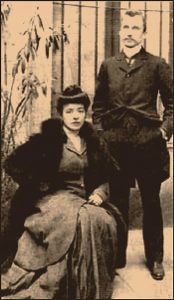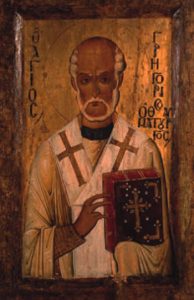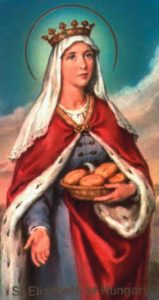November Saints
 Blessed Luigi & Maria Quattrochi
Blessed Luigi & Maria Quattrochi
Luigi was born in 1880 in Catania, Italy. He obtained a degree in law, and entered the service of the Inland Revenue Department, holding responsible positions in the Italian State.
Maria Corsini was born in 1884 to a noble family in Florence. She received a solid cultural formation, loved music, was a professor and writer on education topics, and belonged to several associations, including Women’s Catholic Action.
The couple met at Maria’s home in Florence, and later married. Luigi did not have a strong faith. His love for Maria changed all that. Their zeal for spiritual growth became a kind of race, with Maria in pole position. They are commemorated on 25 November - their wedding anniversary.
The couple began attending morning Mass together, prayed the rosary every evening and consecrated their family to God. They had four children, the last being something of a miracle. Maria had been advised to have an abortion, but she refused and carried the child to term.
Luigi and Maria injected a huge sense of fun into their home which was, according to friends, happy and particularly noisy at mealtime. They raised their children to love the things that could not be seen, saying they wanted the youngsters to appreciate life ‘from the roof up’.
They both knew the dangers of war firsthand. During the turmoil this caused, they revealed their spiritual depth in small, quiet ways, witnessed only by friends and family. They never lost heart despite the difficulties of family life: the tragedies of war, two sons as chaplains in the army, the German occupation of Rome.
In November 1951, Luigi died of a heart attack; Maria died fourteen years later. They were a couple who knew how to love and respect each other in the ups and downs of married and family life. They found in the love of God the strength always to begin again.
Blessed Luigi and Maria, obtain for married couples the grace of fidelity.
Source: Internet – various
 Saint Gregory the Wonderworker
Saint Gregory the Wonderworker
(c. 268)
Gregory was born of a distinguished pagan family at Neocaesarea, Pontus, and studied law there. About 233, he and his brother met Origen and eventually became Christians.
Gregory returned to Neocaesarea about 238, intending to practise law, but was elected bishop. He preached eloquently, making so many converts that he was able to build a church, and soon was so renowned for his miracles that he was surnamed the wonderworker.
He was much sought after for his wisdom, legal knowledge and ability. He survived the persecution of Decius, a plague which struck his See and the devastation of Pontus by the Goths.
During the construction of a church for his growing flock, the builders ran into a problem with a huge buried boulder. Gregory ordered the rock to move out of the way of his church; it did!
He participated in the Synod of Antioch. It is reported that at his death at Neocaesarea, only seventeen unbelievers were left in the city.
Saint Gregory, help us to have faith to move mountains.
Source: www.catholic.org
 Saint Elizabeth of Hungary
Saint Elizabeth of Hungary
(1207-1231)
The daughter of the King of Hungary, Elizabeth rejected a life of leisure and luxury.
At the age of 14, Elizabeth was married to Louis of Thuringia, to whom she bore three children. Under the spiritual direction of a Franciscan friar, she led a life of prayer, sacrifice, and service to the poor and sick. Seeking to become one with the poor, she wore simple clothing. Daily, she would take bread to hundreds of the poorest in the land who came to her gate.
After six years of marriage, her husband died in the Crusades. His family felt she was squandering the royal purse, and finally threw her out of the palace. The return of her husband’s allies from the Crusades resulted in her reinstatement, since her son was legal heir to the throne.
In 1228, Elizabeth joined the Secular Franciscan Order, and cared for the poor in a hospital which she founded in honour of Saint Francis. Elizabeth’s health declined, and she died before her 24th birthday in 1231.
Saint Elizabeth, give us a true and practical love for the poor.
Source: www.franciscanmedia.org
 Entries(RSS)
Entries(RSS)